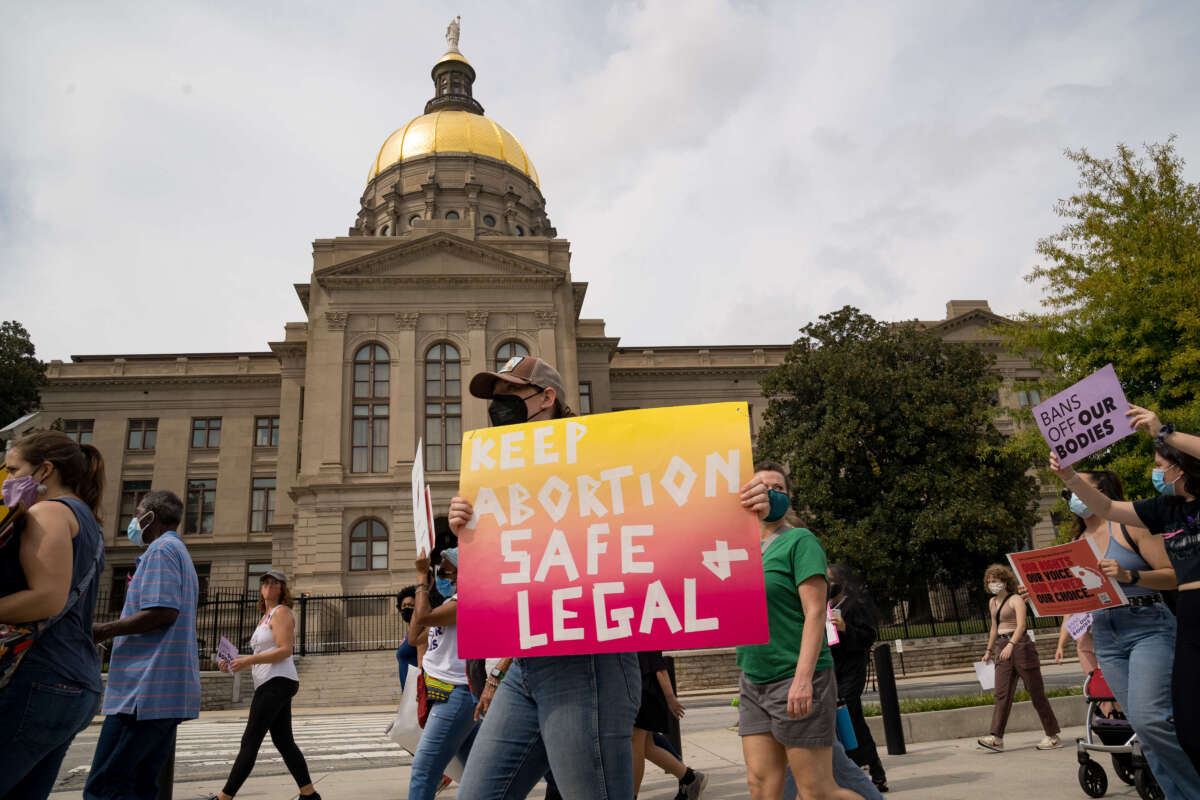On Monday, a Georgia judge struck down the state’s six-week abortion ban, finding that the law unconstitutionally violated residents’ liberties.
The law — known as the LIFE Act — was signed by Gov. Brian Kemp (R) in 2019, but only went into effect in 2022, when the U.S. Supreme Court dismantled federal abortion protections that had been established by Roe v. Wade. Fulton County Superior Court Judge Robert McBurney found that the state law conflicted with previous state court interpretations of liberty regarding health care rights.
“Our higher courts’ interpretations of ‘liberty’ demonstrates that liberty in Georgia includes in its meaning, in its protections, and in its bundle of rights the power” of people to control their own bodies, and to “reject state interference” with regard to personal health care choices, McBurney said in his ruling.
“[D]oes a Georgian’s right to liberty of privacy encompass the right to make personal healthcare decisions? Plainly it does,” McBurney added.
McBurney wrote that the liberty rights of Georgians in this regard weren’t “unlimited,” however, and said that state lawmakers had the right to regulate abortion around the time of fetal viability, generally regarded as around 22-25 weeks of pregnancy.
The Fulton County judge also condemned the law for suggesting that pregnant people should be treated like “collectively owned community property.” He added:
While the State’s interest in protecting ‘unborn’ life is compelling, until that life can be sustained by the State ― and not solely by the woman compelled by the Act to do the State’s work ― the balance of rights favors the woman.
The office of Attorney General Christopher Carr (R) promised to appeal the decision, with a spokesperson saying the office would try to do so “immediately.”
McBurney’s ruling was lauded by abortion rights advocates, including Monica Simpson, executive director of SisterSong Women of Color Reproductive Justice Collective, which originally brought the lawsuit forward.
“Today’s win was hard-fought and is a significant step in the right direction,” Simpson said. “Every day the ban has been in place has been a day too long ― and we have felt the consequences, especially our Black and brown communities.”
In a statement that was shared with Truthout, Unite for Reproductive & Gender Equity (URGE) Southeastern field director Shante Wolfe described McBurney’s ruling as “a critical milestone for Georgians and supporters of reproductive justice.”
“The court’s move is a testament to the power of collective action, driven by activists, organizers, legislators, and most importantly, everyday people,” Wolfe said.
“As we celebrate this moment, thinking about all those who can now access care without fear of criminalization, we must also recognize that reproductive justice is bigger than abortion: Our fight continues until we dismantle all systems that deny our ability to live full, dignified lives,” Wolfe added.
“Together, we will build a future where everyone has full bodily autonomy, free from interference from the state.”
Angry, shocked, overwhelmed? Take action: Support independent media.
We’ve borne witness to a chaotic first few months in Trump’s presidency.
Over the last months, each executive order has delivered shock and bewilderment — a core part of a strategy to make the right-wing turn feel inevitable and overwhelming. But, as organizer Sandra Avalos implored us to remember in Truthout last November, “Together, we are more powerful than Trump.”
Indeed, the Trump administration is pushing through executive orders, but — as we’ve reported at Truthout — many are in legal limbo and face court challenges from unions and civil rights groups. Efforts to quash anti-racist teaching and DEI programs are stalled by education faculty, staff, and students refusing to comply. And communities across the country are coming together to raise the alarm on ICE raids, inform neighbors of their civil rights, and protect each other in moving shows of solidarity.
It will be a long fight ahead. And as nonprofit movement media, Truthout plans to be there documenting and uplifting resistance.
As we undertake this life-sustaining work, we appeal for your support. We have 24 hours left in our fundraiser: Please, if you find value in what we do, join our community of sustainers by making a monthly or one-time gift.
